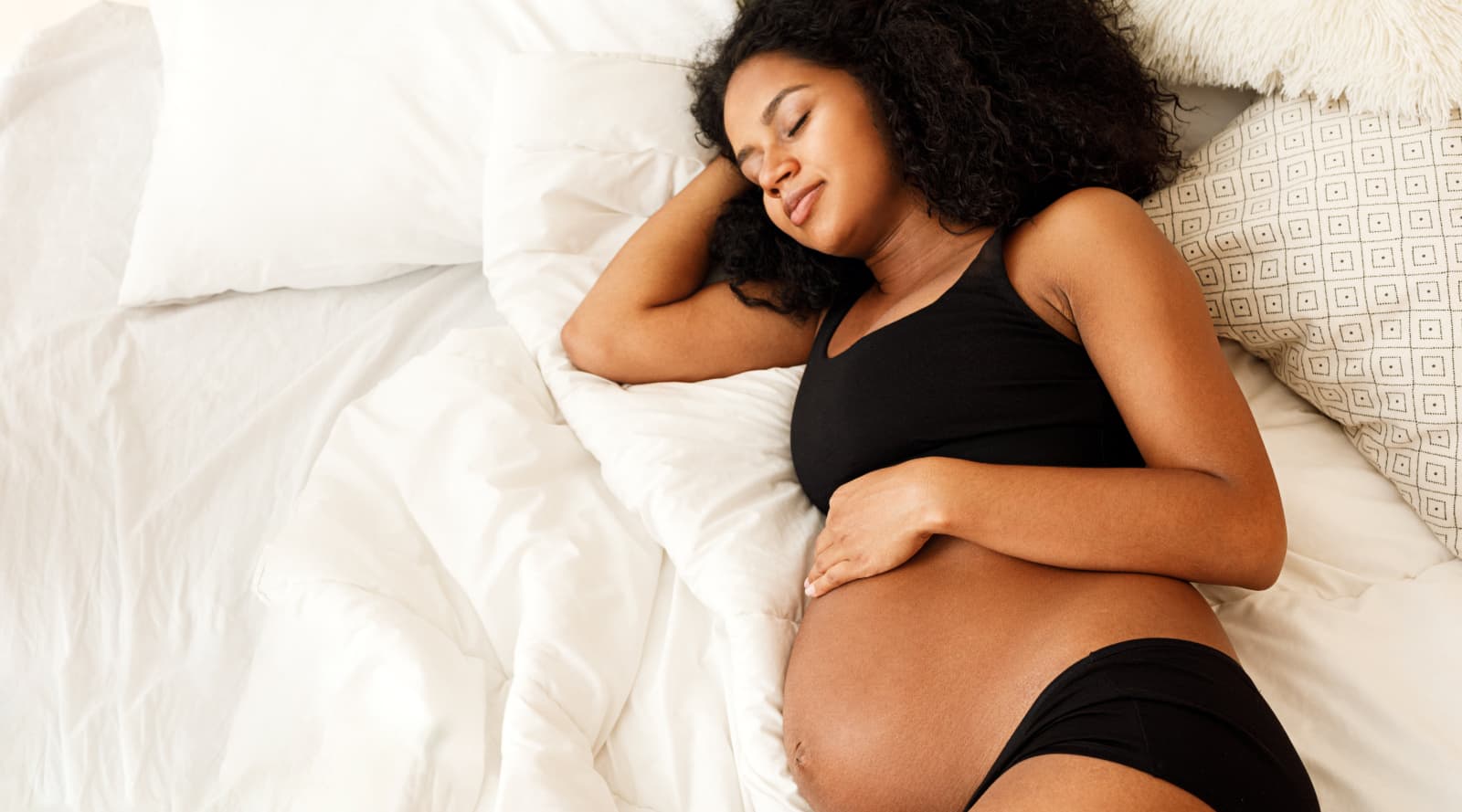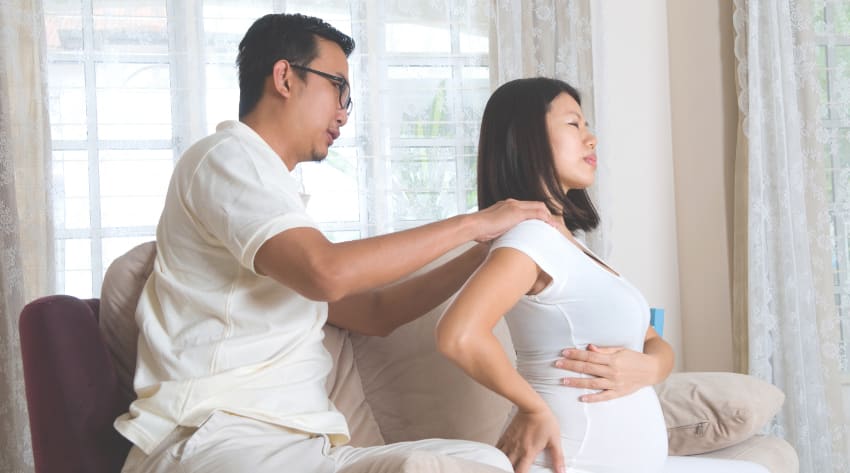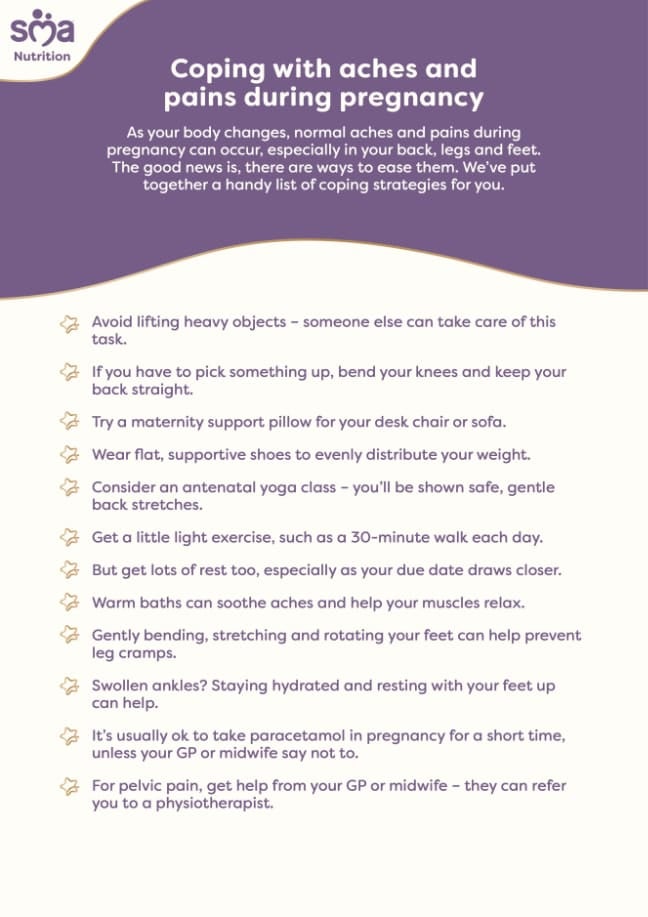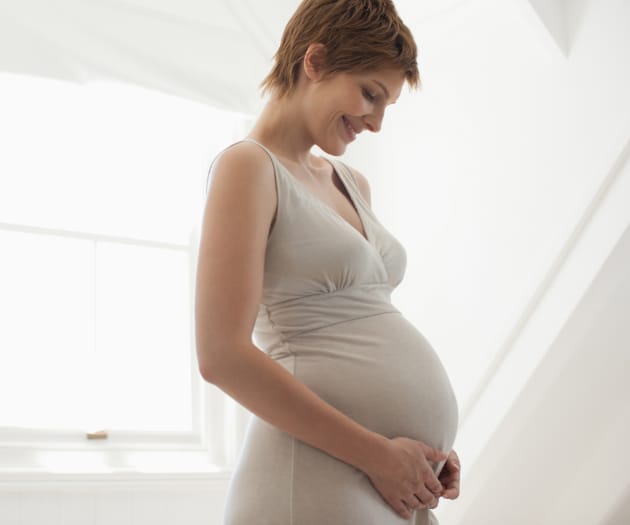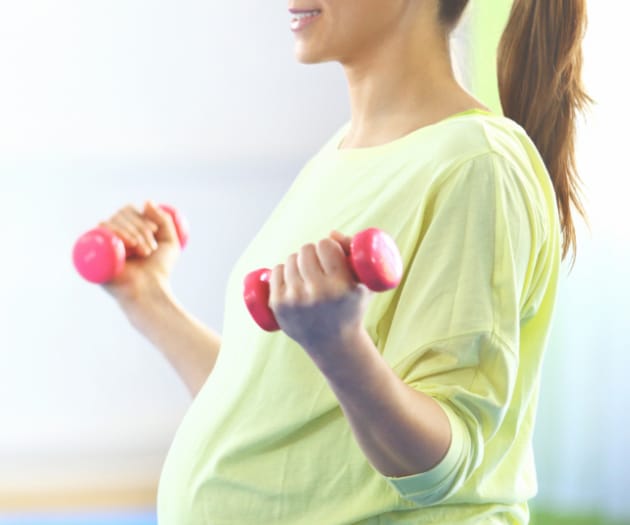Introduction
Getting a good night’s sleep in pregnancy can be difficult, between baby wriggling and the never-ending trips to the loo you may wonder if you’ll ever get a good night’s sleep again. There are things you can do to help sleep, read our guide to find out more.
The main reasons why sleeping might be difficult during pregnancy
Heartburn in pregnancy
During pregnancy, progesterone causes the stomach valve that stops acid entering the oesophagus to relax. A growing uterus also causes overflow. Try eating smaller portions more often and eating them slowly. Before you take any sleeping remedies, speak to your GP as these may not be recommended for expecting mums.
Pregnancy nausea at night
It’s not confirmed exactly why pregnancy sickness occurs, but it can be brought on by food, smells or even multivitamins. Try and make a note of any of your triggers and consider swapping to a different pregnancy multivitamin to see if this helps. If you’re still struggling, speak to your GP for more advice. Always tell your GP or midwife if you’re considering any complimentary therapies, as not all are safe during pregnancy.
Increased urination during pregnancy
Hormonal changes (specifically HGC) cause more blood flow to the pelvis and kidneys. Plus, at night, due to gravity, the fluid in your legs and feet is sent towards your bladder via your bloodstream. To make things worse, your uterus might be resting on your bladder, even in that first trimester. Leaning forward for a wee can empty your bladder properly. Do keep drinking water though, dehydration could give you a painful urinary tract infection otherwise. Read more about UTIs to know what to look for.
Long daytime naps
Fatigue and sleepiness are working against each other. With so much going on, your body can feel exhausted in the day and by the time evening comes your rhythm might be all out. Daytime napping during pregnancy can be very tempting when you’re tired but try to keep them to a minimum. Try not to do lots of tiring chores at home, save your energy for gentle exercises and you may find yourself sleeping easier.
Pregnancy Insomnia
Pregnancy insomnia is common and often caused by your hormones. It sometimes creeps up in the first trimester. If you’re up at night try and use the time to read a book (not screen-time as the lights affect your ability to sleep). You could also try pregnancy meditation techniques. Visit headspace for some help.
Leg cramps during pregnancy
Leg cramps during pregnancy is yet another condition there’s no true explanation for. Running? The weight of the baby? Hot weather and dehydration? It may also be caused if you have a medical condition like diabetes. Try stretching your calf muscles before bedtime and remember potassium and calcium are known to help – try a yoghurt plus banana just before bed.
As your body changes, normal aches and pains during pregnancy can occur, especially in your back, legs and feet. The good news is, there are ways to ease them. We’ve put together a handy list of coping strategies for you.
How to help restless leg syndrome during pregnancy
Few things are more distracting than restless legs syndrome (RLS), it affects nearly 1/3rd of pregnant women, caused by an imbalance of the brain chemical dopamine and rising oestrogen levels. Consult your GP and get your iron levels tested. A good pregnancy vitamin that includes folate and iron can reduce the symptoms but talk to your GP before taking. In serious cases they may prescribe medication specifically for during pregnancy. It might be time to browse the wide range of maternity pillows that can support your legs and back.
Baby being in a different time zone
Babies love movement. Just when you start to slow down at night, you might notice a lot more kicking. Some babies really are night owls and if this is your baby you’ll know about it. There’s not always a quick fix, but some mums say that mediation, pregnancy yoga, or even writing down your troubles, fears or to-do lists, can help get your balance back.
Hyperawareness of sounds, smells and light during pregnancy
Around two-thirds of women rate their sense of smell as stronger than usual while pregnant, so maybe you and your partner should avoid those cooking spices for a bit. If you’re extra sensitive to light, think about black-out blinds - you’ll also appreciate these when baby arrives and needs to learn about circadian rhythms (or light-related sleep patterns). Remove anything that ticks or makes a distracting noise and use earplugs if your partner insists on listening to podcasts (or get them headphones). If you need something to listen to, try neutral soothing white noise apps or relaxing audiobooks.
The environment
If mum-to-be is trying to get some shut-eye, partners should try and remember not to use the bedroom as a place to stay up late. Lights and screens off will make all the difference. Snoring won’t be appreciated much either, so nose clips and earplugs could be handy additions to the shopping list.
What else can you do to get sleep during pregnancy?
- Switch off your TV or laptop at least an hour before you go to bed, to rest your eyes and brain from screen glare. Enjoy a warm bath or a good book instead.
- Trade your afternoon and evening cuppa for some warm milk with cinnamon or nutmeg, or camomile tea.
- When possible, go to bed around the same time each night to establish a routine during pregnancy.
- Try a breath of fresh air with 30 minutes of gentle exercise in the great outdoors.
- If you and your partner are in the mood, intimacy could work. Having sex releases chemicals proven to help you sleep.
Shifting to sleep mode
Time to decompress and do whatever you can to make sleep easier. Try listening to the background sounds in the room and even rub your fingers on the sheets. As your mind clears, your body relaxes and you are entering your ‘sleep mode’.
Sleeping position during pregnancy
Finding a comfortable sleeping position during pregnancy can be a pain - literally. Here are a few tips to help you:
- After 16 weeks, try sleeping on your side. Sleeping on your back during pregnancy can not only be uncomfortable but can make you feel faint as your uterus presses on your main blood vessels.
- Try pillows placed between your knees and in the small of your back to support your legs, hips and back and relieve discomfort.
The HSE has more tips and advice on tiredness, sleeping positions and insomnia in pregnancy.
Relaxation exercise during pregnancy
Being relaxed is an important part of falling asleep. Here’s a simple meditation exercise that works for many people:
Starting at your head, make your way down your body, relaxing each part as you do. As you move down, gently observe each organ and limb objectively and repeat the affirmation that the organ/limb you are thinking about is relaxed.
This type of meditation can help with anxiety and stress and may even help to alleviate the disorienting psychedelia of pregnancy dreams.



